Campus/People
-
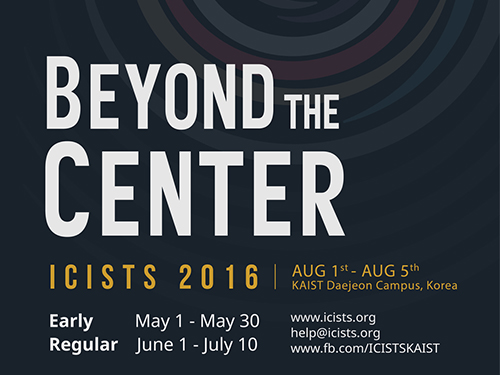 ICISTS Hosts the International Interdisciplinary Conference
A KAIST student organization, The International Conference for the Integration of Science, Technology and Society (ICISTS), will host ICISTS 2016 at the Hotel ICC in Daejeon from 3 to 7 August with the participation of around 300 Korean and international students.
ICISTS was first established in 2005 to provide an annual platform for delegates and speakers to discuss the integration and the convergence of science, technology, and society regardless of their academic backgrounds.
This year’s conference, with the theme of “Beyond the Center,” emphasizes the ways in which technological advancements can change central organizations in areas such as financial technology, healthcare, and global governance.
The keynote speakers include Dennis Hong, a developer of the first automobile for the blind and a professor of the Mechanical and Aerospace Engineering Department at UCLA, Dor Konforty, a founder and a CEO of SNS platform Synereo, and Marzena Rostek, a professor of Economics at the University of Wisconsin-Madison.
Other notable speakers include: Gi-Jung Jung, Head of the National Fusion Research Institute; Janos Barberis, Founder of FinTech HK; Tae-Hoon Kim, CEO and Founder of Rainist; Gulrez Shah Azhar, Assistant Policy Analyst at RAND Corporation; Thomas Concannon, Senior Policy Researcher at RAND Corporation; Leah Vriesman, Professor at the School of Public Health, UCLA; and Bjorn Cumps, Professor of Management Practice at Vlerick Business School in Belgium.
The conference consists of keynote speeches, panel discussions, open talks, experience sessions, team project presentations, a culture night, and a beer party, at which all participants will be encouraged to interact with speakers and delegates and to discuss the topics of their interest.
Han-Kyul Jung, ICISTS’s Head of Public Relations, said, “This conference will not only allow the delegates to understand the trends of future technology, but also be an opportunity for KAIST students to form valuable contacts with students from around the world.”
For more information, please go to www.icists.org.
2016.07.20 View 8884
ICISTS Hosts the International Interdisciplinary Conference
A KAIST student organization, The International Conference for the Integration of Science, Technology and Society (ICISTS), will host ICISTS 2016 at the Hotel ICC in Daejeon from 3 to 7 August with the participation of around 300 Korean and international students.
ICISTS was first established in 2005 to provide an annual platform for delegates and speakers to discuss the integration and the convergence of science, technology, and society regardless of their academic backgrounds.
This year’s conference, with the theme of “Beyond the Center,” emphasizes the ways in which technological advancements can change central organizations in areas such as financial technology, healthcare, and global governance.
The keynote speakers include Dennis Hong, a developer of the first automobile for the blind and a professor of the Mechanical and Aerospace Engineering Department at UCLA, Dor Konforty, a founder and a CEO of SNS platform Synereo, and Marzena Rostek, a professor of Economics at the University of Wisconsin-Madison.
Other notable speakers include: Gi-Jung Jung, Head of the National Fusion Research Institute; Janos Barberis, Founder of FinTech HK; Tae-Hoon Kim, CEO and Founder of Rainist; Gulrez Shah Azhar, Assistant Policy Analyst at RAND Corporation; Thomas Concannon, Senior Policy Researcher at RAND Corporation; Leah Vriesman, Professor at the School of Public Health, UCLA; and Bjorn Cumps, Professor of Management Practice at Vlerick Business School in Belgium.
The conference consists of keynote speeches, panel discussions, open talks, experience sessions, team project presentations, a culture night, and a beer party, at which all participants will be encouraged to interact with speakers and delegates and to discuss the topics of their interest.
Han-Kyul Jung, ICISTS’s Head of Public Relations, said, “This conference will not only allow the delegates to understand the trends of future technology, but also be an opportunity for KAIST students to form valuable contacts with students from around the world.”
For more information, please go to www.icists.org.
2016.07.20 View 8884 -
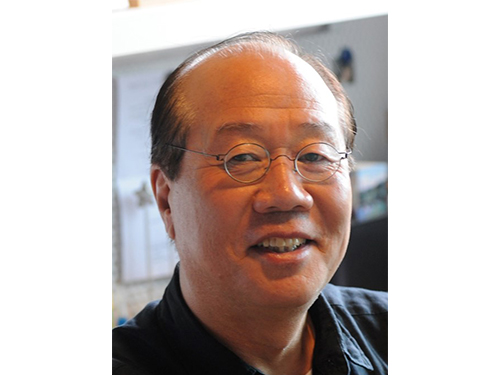 Professor Kun-pyo Lee Appointed Honorary Fellow of the Design Research Society
Founded in the United Kingdom (UK) in 1966, the Design Research Society is an international academic organization that promotes excellence in design and supports the interests of the design research community.
Professor Kun-pyo Lee of the Industrial Design Department at KAIST received his honorary fellowship from the Society at its 50th international conference held from June 27, 2016 to July 3, 2016 in Brighton, UK.
The Society recognized Professor Lee’s academic achievements and his contribution to the advancement of design research nationally and globally. To date, only eight researchers have received honorary fellowships from the Society, and he is the first Asian to become an honorary fellow.
Professor Lee has worked at KAIST for more than 30 years as a professor in industrial engineering and served on various important positions such as the president of the Korean Society of Design Science, the president of the International Association of Societies of Design Research, an executive vice president of the Corporate Design Center at LG Electronics, and an advisory board member for Human-centered Design Network in Japan and UXnet in the United States.
By introducing the concept of user experience (UX) in Korea for the first time, he developed this field while focusing on user-centered designs to optimize interactive digital products as well as interaction design to create mental and physical interfaces between people and interactive digital products, services, and systems.
Professor Lee said, “I am pleased to become an honorary fellow of the Design Research Society. For quiet some time, industrial design remained in the domain of practical studies, lacking the kind of support needed to grow as an independent academic and research discipline, but this has changed rapidly in recent years. I will continue to remain actively involved in the development of industrial design engineering in Korea and the world.”
2016.07.19 View 8617
Professor Kun-pyo Lee Appointed Honorary Fellow of the Design Research Society
Founded in the United Kingdom (UK) in 1966, the Design Research Society is an international academic organization that promotes excellence in design and supports the interests of the design research community.
Professor Kun-pyo Lee of the Industrial Design Department at KAIST received his honorary fellowship from the Society at its 50th international conference held from June 27, 2016 to July 3, 2016 in Brighton, UK.
The Society recognized Professor Lee’s academic achievements and his contribution to the advancement of design research nationally and globally. To date, only eight researchers have received honorary fellowships from the Society, and he is the first Asian to become an honorary fellow.
Professor Lee has worked at KAIST for more than 30 years as a professor in industrial engineering and served on various important positions such as the president of the Korean Society of Design Science, the president of the International Association of Societies of Design Research, an executive vice president of the Corporate Design Center at LG Electronics, and an advisory board member for Human-centered Design Network in Japan and UXnet in the United States.
By introducing the concept of user experience (UX) in Korea for the first time, he developed this field while focusing on user-centered designs to optimize interactive digital products as well as interaction design to create mental and physical interfaces between people and interactive digital products, services, and systems.
Professor Lee said, “I am pleased to become an honorary fellow of the Design Research Society. For quiet some time, industrial design remained in the domain of practical studies, lacking the kind of support needed to grow as an independent academic and research discipline, but this has changed rapidly in recent years. I will continue to remain actively involved in the development of industrial design engineering in Korea and the world.”
2016.07.19 View 8617 -
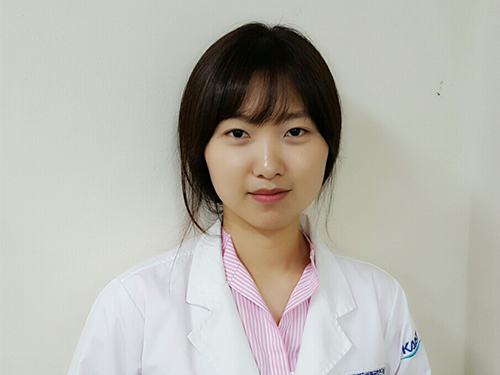 Doctoral Student Receives the Best Paper Award from the International Metabolic Engineering Conference 2016
So Young Choi, a Ph.D. candidate at the Department of Chemical and Biomolecular Engineering at KAIST, received the Student and Young Investigator Poster Award at the 11th International Metabolic Engineering Conference held in Awaji, Japan on June 26-30.
Choi received the award for her research on one-step fermentative production of Poly(lactate-co-glycolate) (PLGA) from carbohydrates in Escherichia coli, which was published in the April 2016 issue of Nature Biotechnology.
In her paper, she presented a novel technology to synthesize PLGA, a non-natural copolymer, through a biological production process. Because of its biodegradability, non-toxicity, and biocompatibility, PLGA is widely used in biomedical and therapeutic applications, including surgical sutures, prosthetic devices, drug delivery, and tissue engineering.
Employing a metabolic engineering approach, Choi manipulated the metabolic pathway of an Escherichia coli bacterium to convert glucose and xylose into the biosynthesis of PLGA within the cell. Previously, PLGA could be obtained only through chemical synthesis.
Choi said, “I’m thrilled to receive an award from a flagship conference of my research field. Mindful of this recognition, I will continue my research to produce meaningful results, thereby contributing to the development of science and technology in Korea.”
The International Metabolic Engineering Conference is a leading professional gathering where state-of-the-art developments and achievements made in the field of metabolic engineering are shared. With the participation of about 400 professionals from all around the world, the conference participants discussed this year’s theme of “Design, Synthesis and System Integration for Metabolic Engineering.”
2016.07.07 View 11564
Doctoral Student Receives the Best Paper Award from the International Metabolic Engineering Conference 2016
So Young Choi, a Ph.D. candidate at the Department of Chemical and Biomolecular Engineering at KAIST, received the Student and Young Investigator Poster Award at the 11th International Metabolic Engineering Conference held in Awaji, Japan on June 26-30.
Choi received the award for her research on one-step fermentative production of Poly(lactate-co-glycolate) (PLGA) from carbohydrates in Escherichia coli, which was published in the April 2016 issue of Nature Biotechnology.
In her paper, she presented a novel technology to synthesize PLGA, a non-natural copolymer, through a biological production process. Because of its biodegradability, non-toxicity, and biocompatibility, PLGA is widely used in biomedical and therapeutic applications, including surgical sutures, prosthetic devices, drug delivery, and tissue engineering.
Employing a metabolic engineering approach, Choi manipulated the metabolic pathway of an Escherichia coli bacterium to convert glucose and xylose into the biosynthesis of PLGA within the cell. Previously, PLGA could be obtained only through chemical synthesis.
Choi said, “I’m thrilled to receive an award from a flagship conference of my research field. Mindful of this recognition, I will continue my research to produce meaningful results, thereby contributing to the development of science and technology in Korea.”
The International Metabolic Engineering Conference is a leading professional gathering where state-of-the-art developments and achievements made in the field of metabolic engineering are shared. With the participation of about 400 professionals from all around the world, the conference participants discussed this year’s theme of “Design, Synthesis and System Integration for Metabolic Engineering.”
2016.07.07 View 11564 -
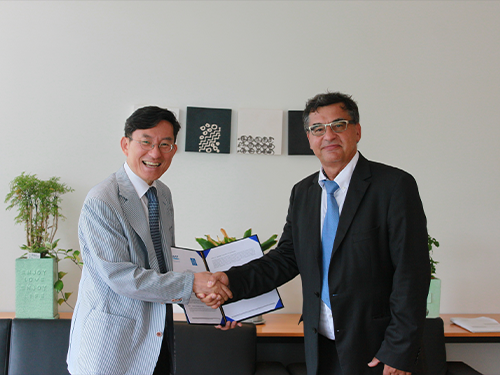 KAIST and KTH Establish a Dual Degree Program in Nuclear Engineering
Professor Man-Sung Im, head of the Nuclear and Quantum Engineering Department at KAIST and Director Waclaw Gudowski of the Physics Department at the KTH Royal Institute of Technology in Stockholm (KTH), Sweden, agreed to establish a dual master’s degree program in the field of nuclear and quantum engineering, and signed the agreement on July 4, 2016 at the Faculty Club on the KAIST campus.
Following the first joint degree program in mechanical engineering in 2014, this is the second dual degree program created between the two universities.
Under the agreement, which will be effective beginning in the 2016 fall semester, KAIST and KTH will exchange students, confer students dual degrees when they earn the required number of credits, and support financial aid for exchange students.
Dean Im said, “The two schools have enjoyed an excellent reputation in nuclear and quantum engineering, and offering students more opportunities to study abroad at the other university will produce synergistic effects for the growth of the two schools' education and research.”
Founded in 1827, KTH is regarded one of the most prestigious universities in Northern Europe.
Professor Man-Sung Im of KAIST’s Nuclear and Quantum Engineering (pictured on the left) and Director Waclaw Gudowski of KTH’s Physics Department are shaking hands after signing the agreement for the dual master’s degree program.
2016.07.05 View 9328
KAIST and KTH Establish a Dual Degree Program in Nuclear Engineering
Professor Man-Sung Im, head of the Nuclear and Quantum Engineering Department at KAIST and Director Waclaw Gudowski of the Physics Department at the KTH Royal Institute of Technology in Stockholm (KTH), Sweden, agreed to establish a dual master’s degree program in the field of nuclear and quantum engineering, and signed the agreement on July 4, 2016 at the Faculty Club on the KAIST campus.
Following the first joint degree program in mechanical engineering in 2014, this is the second dual degree program created between the two universities.
Under the agreement, which will be effective beginning in the 2016 fall semester, KAIST and KTH will exchange students, confer students dual degrees when they earn the required number of credits, and support financial aid for exchange students.
Dean Im said, “The two schools have enjoyed an excellent reputation in nuclear and quantum engineering, and offering students more opportunities to study abroad at the other university will produce synergistic effects for the growth of the two schools' education and research.”
Founded in 1827, KTH is regarded one of the most prestigious universities in Northern Europe.
Professor Man-Sung Im of KAIST’s Nuclear and Quantum Engineering (pictured on the left) and Director Waclaw Gudowski of KTH’s Physics Department are shaking hands after signing the agreement for the dual master’s degree program.
2016.07.05 View 9328 -
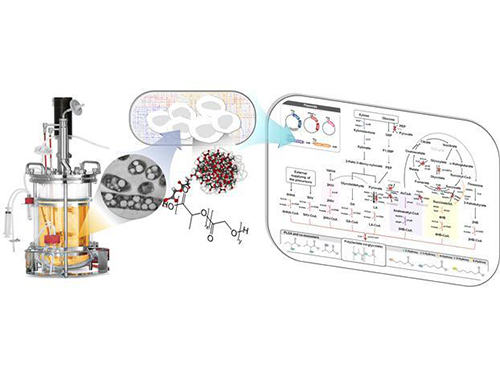 Top 10 Emerging Technologies by World Economic Forum
The World Economic Forum’s Meta-Council on Emerging Technologies announced its annual list of breakthrough technologies, the “Top 10 Emerging Technologies of 2016,” on June 23, 2016. The Meta-Council chose the top ten technologies based on the technologies’ potential to improve lives, transform industries, and safeguard the planet. The research field of systems metabolic engineering, founded by Distinguished Professor Sang Yup Lee of the Chemical and Biomolecular Engineering Department at KAIST, was also citied. Systems metabolic engineering, which combines elements of synthetic biology, systems biology, and evolutionary engineering, offers a sustainable process for the production of useful chemicals in an environmentally friendly way from plants such as inedible biomass, reducing the need of using fossil fuels. Details about the list follow below:
https://www.weforum.org/press/2016/06/battery-powered-villages-sociable-robots-rank-among-top-10-emerging-technologies-of-2016
The picture below shows the “systems metabolic engineering of E. coli for the production of PLGA." PLGA is poly(lactate-co-glycolate), which is widely used for biomedical applications, and has been made by chemical synthesis. Now it is possible to produce PLGA eco-friendly by one-step fermentation of a gut bacterium which is developed through systems metabolic engineering.
2016.06.27 View 11683
Top 10 Emerging Technologies by World Economic Forum
The World Economic Forum’s Meta-Council on Emerging Technologies announced its annual list of breakthrough technologies, the “Top 10 Emerging Technologies of 2016,” on June 23, 2016. The Meta-Council chose the top ten technologies based on the technologies’ potential to improve lives, transform industries, and safeguard the planet. The research field of systems metabolic engineering, founded by Distinguished Professor Sang Yup Lee of the Chemical and Biomolecular Engineering Department at KAIST, was also citied. Systems metabolic engineering, which combines elements of synthetic biology, systems biology, and evolutionary engineering, offers a sustainable process for the production of useful chemicals in an environmentally friendly way from plants such as inedible biomass, reducing the need of using fossil fuels. Details about the list follow below:
https://www.weforum.org/press/2016/06/battery-powered-villages-sociable-robots-rank-among-top-10-emerging-technologies-of-2016
The picture below shows the “systems metabolic engineering of E. coli for the production of PLGA." PLGA is poly(lactate-co-glycolate), which is widely used for biomedical applications, and has been made by chemical synthesis. Now it is possible to produce PLGA eco-friendly by one-step fermentation of a gut bacterium which is developed through systems metabolic engineering.
2016.06.27 View 11683 -
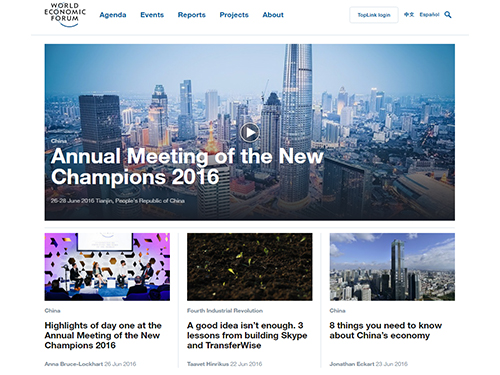 KAIST to Participate in Summer Davos Forum 2016 in China
A group of KAIST researchers will share their insights on the future and challenges of the current technological innovations impacting all aspects of society, while showcasing their research excellence in artificial intelligence and robotics.
Scientific and technological breakthroughs are more important than ever as key agents to drive social, economic, and political changes and advancements in today’s world. The World Economic Forum (WEF), an international organization that provides one of the broadest engagement platforms to address issues of major concern to the global community, will discuss the effects of these breakthroughs at its 10th Annual Meeting of the New Champions, a.k.a., the Summer Davos Forum, in Tianjin, China, June 26-28, 2016.
Three professors from the Korea Advanced Institute of Science and Technology (KAIST) will join the Annual Meeting and offer their expertise in the fields of biotechnology, artificial intelligence, and robotics to explore the conference theme, “The Fourth Industrial Revolution and Its Transformational Impact.” The Fourth Industrial Revolution, a term coined by WEF founder, Klaus Schwab, is characterized by a range of new technologies that fuse the physical, digital, and biological worlds, such as the Internet of Things, cloud computing, and automation.
Distinguished Professor Sang Yup Lee of the Chemical and Biomolecular Engineering Department will speak at the Experts Reception to be held on June 25, 2016 on the topic of “The Summer Davos Forum and Science and Technology in Asia.” On June 27, 2016, he will participate in two separate discussion sessions.
In the first session entitled “What If Drugs Are Printed from the Internet?,” Professor Lee will discuss the impacts of advancements in biotechnology and 3D printing technology on the future of medicine with Nita A. Farahany, a Duke University professor. Clare Matterson, the Director of Strategy at Wellcome Trust in the United Kingdom, will serve as the moderator. The discussants will note recent developments made in the way patients receive their medicine, for example, downloading drugs directly from the internet and the production of yeast strains to make opioids for pain treatment through systems metabolic engineering. They will also suggest how these emerging technologies will transform the landscape of the pharmaceutical industry in the years to come.
In the second session, “Lessons for Life,” Professor Lee will talk about how to nurture life-long learning and creativity to support personal and professional growth necessary in an era of the new industrial revolution.
During the Annual Meeting, Professors Jong-Hwan Kim of the Electrical Engineering School and David Hyunchul Shim of the Aerospace Department will host, together with researchers from Carnegie Mellon University and AnthroTronix, an engineering research and development company, a technological exhibition on robotics. Professor Kim, the founder of the internally renowned Robot World Cup, will showcase his humanoid soccer-playing micro-robots and display their various cutting-edge technologies such as imaging processing, artificial intelligence, walking, and balancing. Professor Shim will present a human-like robotic piloting system, PIBOT, which autonomously operates a simulated flight program by employing control sticks and guiding an airplane from takeoff to landing.
In addition, the two professors will join Professor Lee, who is also a moderator, to host a KAIST-led session on June 26, 2016, entitled “Science in Depth: From Deep Learning to Autonomous Machines.” Professors Kim and Shim will explore new opportunities and challenges in their fields from machine learning to autonomous robotics, including unmanned vehicles and drones.
Since 2011, KAIST has participated in the World Economic Forum’s two flagship conferences, the January and June Davos Forums, to introduce outstanding talents, share their latest research achievements, and interact with global leaders.
KAIST President Steve Kang said, “It is important for KAIST to be involved in global forums that identify issues critical to humanity and seek answers to solve them, and where our skills and knowledge in science and technology can play a meaningful role. The Annual Meeting in China will become another venue to accomplish this.”
2016.06.27 View 13204
KAIST to Participate in Summer Davos Forum 2016 in China
A group of KAIST researchers will share their insights on the future and challenges of the current technological innovations impacting all aspects of society, while showcasing their research excellence in artificial intelligence and robotics.
Scientific and technological breakthroughs are more important than ever as key agents to drive social, economic, and political changes and advancements in today’s world. The World Economic Forum (WEF), an international organization that provides one of the broadest engagement platforms to address issues of major concern to the global community, will discuss the effects of these breakthroughs at its 10th Annual Meeting of the New Champions, a.k.a., the Summer Davos Forum, in Tianjin, China, June 26-28, 2016.
Three professors from the Korea Advanced Institute of Science and Technology (KAIST) will join the Annual Meeting and offer their expertise in the fields of biotechnology, artificial intelligence, and robotics to explore the conference theme, “The Fourth Industrial Revolution and Its Transformational Impact.” The Fourth Industrial Revolution, a term coined by WEF founder, Klaus Schwab, is characterized by a range of new technologies that fuse the physical, digital, and biological worlds, such as the Internet of Things, cloud computing, and automation.
Distinguished Professor Sang Yup Lee of the Chemical and Biomolecular Engineering Department will speak at the Experts Reception to be held on June 25, 2016 on the topic of “The Summer Davos Forum and Science and Technology in Asia.” On June 27, 2016, he will participate in two separate discussion sessions.
In the first session entitled “What If Drugs Are Printed from the Internet?,” Professor Lee will discuss the impacts of advancements in biotechnology and 3D printing technology on the future of medicine with Nita A. Farahany, a Duke University professor. Clare Matterson, the Director of Strategy at Wellcome Trust in the United Kingdom, will serve as the moderator. The discussants will note recent developments made in the way patients receive their medicine, for example, downloading drugs directly from the internet and the production of yeast strains to make opioids for pain treatment through systems metabolic engineering. They will also suggest how these emerging technologies will transform the landscape of the pharmaceutical industry in the years to come.
In the second session, “Lessons for Life,” Professor Lee will talk about how to nurture life-long learning and creativity to support personal and professional growth necessary in an era of the new industrial revolution.
During the Annual Meeting, Professors Jong-Hwan Kim of the Electrical Engineering School and David Hyunchul Shim of the Aerospace Department will host, together with researchers from Carnegie Mellon University and AnthroTronix, an engineering research and development company, a technological exhibition on robotics. Professor Kim, the founder of the internally renowned Robot World Cup, will showcase his humanoid soccer-playing micro-robots and display their various cutting-edge technologies such as imaging processing, artificial intelligence, walking, and balancing. Professor Shim will present a human-like robotic piloting system, PIBOT, which autonomously operates a simulated flight program by employing control sticks and guiding an airplane from takeoff to landing.
In addition, the two professors will join Professor Lee, who is also a moderator, to host a KAIST-led session on June 26, 2016, entitled “Science in Depth: From Deep Learning to Autonomous Machines.” Professors Kim and Shim will explore new opportunities and challenges in their fields from machine learning to autonomous robotics, including unmanned vehicles and drones.
Since 2011, KAIST has participated in the World Economic Forum’s two flagship conferences, the January and June Davos Forums, to introduce outstanding talents, share their latest research achievements, and interact with global leaders.
KAIST President Steve Kang said, “It is important for KAIST to be involved in global forums that identify issues critical to humanity and seek answers to solve them, and where our skills and knowledge in science and technology can play a meaningful role. The Annual Meeting in China will become another venue to accomplish this.”
2016.06.27 View 13204 -
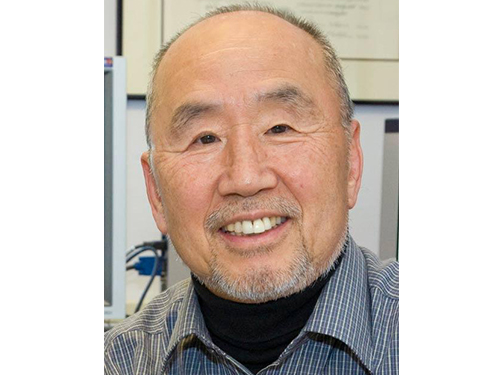 Special Lecture by Professor Sung-Hou Kim of UC Berkeley
As part of its special lecture series, the Department of Biological Sciences at KAIST has invited Professor Sung-Hou Kim of the Department of Chemistry at the University of California, Berkeley, to lecture on his research in structural biology. He will speak twice on May 23 and 30, respectively, on the topics “Origin of Universe and Earth—A Narrative” and “Origin of Life and Human Species—A Narrative.”
Professor Kim's research addresses the structural basis of molecules to reveal how they communicate with each other to activate or inhibit particular processes in cell growth, cell differentiation, and cancer. Using the single-crystal X-ray diffraction technology, he discovered, for the first time in the world, the three-dimensional (3-D) structure of a transfer RNA (t-RNA) and received much praise for this work from the scientific community. Since then, he has been cited as a candidate for a Nobel Prize in Chemistry for many years.
He also examined the 3-D structures of a RAS protein in normal and cancer cells and identified the mutations of the RAS protein as a cause for cancer. His work has assisted in the development of target drugs for cancer treatment. In recent years, he has adopted a computational biology approach to study the structure and function of biological genomics, with which he has tried to predict disease-sensitive genes.
Professor Kim graduated from Seoul National University in 1962 and received his Ph.D. degree in chemistry from the University of Pittsburgh in the United States in 1966. He worked at the Massachusetts Institute of Technology (MIT) as a senior research scientist, and has taught at UC Berkeley since 1978.
2016.05.23 View 7369
Special Lecture by Professor Sung-Hou Kim of UC Berkeley
As part of its special lecture series, the Department of Biological Sciences at KAIST has invited Professor Sung-Hou Kim of the Department of Chemistry at the University of California, Berkeley, to lecture on his research in structural biology. He will speak twice on May 23 and 30, respectively, on the topics “Origin of Universe and Earth—A Narrative” and “Origin of Life and Human Species—A Narrative.”
Professor Kim's research addresses the structural basis of molecules to reveal how they communicate with each other to activate or inhibit particular processes in cell growth, cell differentiation, and cancer. Using the single-crystal X-ray diffraction technology, he discovered, for the first time in the world, the three-dimensional (3-D) structure of a transfer RNA (t-RNA) and received much praise for this work from the scientific community. Since then, he has been cited as a candidate for a Nobel Prize in Chemistry for many years.
He also examined the 3-D structures of a RAS protein in normal and cancer cells and identified the mutations of the RAS protein as a cause for cancer. His work has assisted in the development of target drugs for cancer treatment. In recent years, he has adopted a computational biology approach to study the structure and function of biological genomics, with which he has tried to predict disease-sensitive genes.
Professor Kim graduated from Seoul National University in 1962 and received his Ph.D. degree in chemistry from the University of Pittsburgh in the United States in 1966. He worked at the Massachusetts Institute of Technology (MIT) as a senior research scientist, and has taught at UC Berkeley since 1978.
2016.05.23 View 7369 -
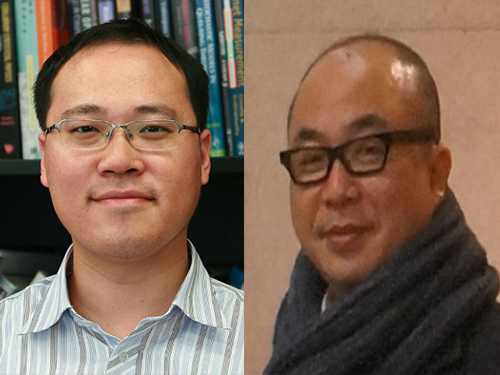 KAIST Researchers Receive the 2016 IEEE William R. Bennett Prize
A research team led by Professors Yung Yi and Song Chong from the Electrical Engineering Department at KAIST has been awarded the 2016 William R. Bennett Prize of the Institute of Electrical and Electronics Engineers (IEEE), which is the most prestigious award in the field of communications network. The IEEE bestows the honor annually and selects winning papers from among those published in the past three years for its quality, originality, scientific citation index, and peer reviews.
The IEEE award ceremony will take place on May 24, 2016 at the IEEE International Conference on Communications in Kuala Lumpur, Malaysia.
The team members include Dr. Kyoung-Han Lee, a KAIST graduate, who is currently a professor at Ulsan National Institute of Science and Technology (UNIST) in Korea, Dr. Joo-Hyun Lee, a postdoctoral researcher at Ohio State University in the United States, and In-Jong Rhee, a vice president of the Mobile Division at Samsung Electronics. The same KAIST team previously received the award back in 2013, making them the second recipient ever to win the IEEE William R. Bennett Prize twice.
Past winners include Professors Robert Gallager of the Massachusetts Institute of Technology (MIT), Sachin Katti of Stanford University, and Ion Stoica of the University of California at Berkeley.
The research team received the Bennett award for their work on “Mobile Data Offloading: How Much Can WiFi Deliver?” Their research paper has been cited more than 500 times since its publication in 2013. They proposed an original method to effectively offload the cellular network and maximize the Wi-Fi network usage by analyzing the pattern of individual human mobility in daily life.
2016.05.02 View 14236
KAIST Researchers Receive the 2016 IEEE William R. Bennett Prize
A research team led by Professors Yung Yi and Song Chong from the Electrical Engineering Department at KAIST has been awarded the 2016 William R. Bennett Prize of the Institute of Electrical and Electronics Engineers (IEEE), which is the most prestigious award in the field of communications network. The IEEE bestows the honor annually and selects winning papers from among those published in the past three years for its quality, originality, scientific citation index, and peer reviews.
The IEEE award ceremony will take place on May 24, 2016 at the IEEE International Conference on Communications in Kuala Lumpur, Malaysia.
The team members include Dr. Kyoung-Han Lee, a KAIST graduate, who is currently a professor at Ulsan National Institute of Science and Technology (UNIST) in Korea, Dr. Joo-Hyun Lee, a postdoctoral researcher at Ohio State University in the United States, and In-Jong Rhee, a vice president of the Mobile Division at Samsung Electronics. The same KAIST team previously received the award back in 2013, making them the second recipient ever to win the IEEE William R. Bennett Prize twice.
Past winners include Professors Robert Gallager of the Massachusetts Institute of Technology (MIT), Sachin Katti of Stanford University, and Ion Stoica of the University of California at Berkeley.
The research team received the Bennett award for their work on “Mobile Data Offloading: How Much Can WiFi Deliver?” Their research paper has been cited more than 500 times since its publication in 2013. They proposed an original method to effectively offload the cellular network and maximize the Wi-Fi network usage by analyzing the pattern of individual human mobility in daily life.
2016.05.02 View 14236 -
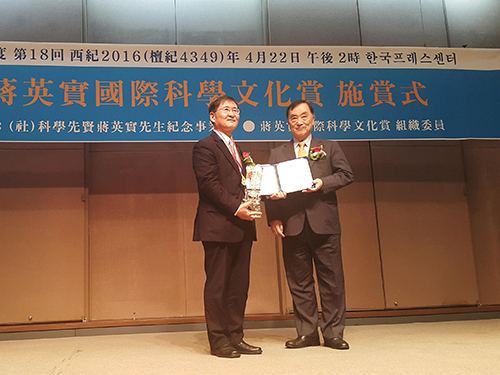 President Sung-Mo Kang Receives the Jang Young-sil Award
On April 22, 2016, President Sung-Mo Kang of KAIST became the 18th recipient of the Jang Young-sil Award. The Jang Young-sil Memorial Association of Korea awarded the prize to him at the Korea Press Center in Seoul.
The award, created in 1999 by the Jang Young-sil Memorial Association of Korea to recognize those scientists who have made significant contributions to the development of Korean science and technology, is bestowed annually.
Jang Young-sil was a highly regarded Korean scientist and astronomer during the Joseon Dynasty (1392-1897), whose major inventions were a sundial, a water clock, and a rain gauge.
In the award ceremony, the association said that President Kang had devoted much of his life to the advancement of science education and research, globally and nationally, as an educator, scholar, administrator, and researcher and that his accomplishments have served as an example of leadership for young scientists.
In his acceptance speech, President Kang expressed his gratitude for the award and said,
“I am honored to receive an award in the name of our great ancestor scientist Jang Young-sil who, despite his low birth as a peasant, rose to become an excellent scientist and built a remarkable legacy of science for Korea. While cherishing his spirit, creativity and grit, I will continue to working hard to foster outstanding scientists and engineers who are needed not only by Korea but also by the global community.”
In the photo, Dr. Gun-Mo Chung (pictured on the right), the former Minister of Science and Technology of Korea presents the Jang Young-sil Award to President Sung-Mo Kang (left).
2016.04.22 View 5902
President Sung-Mo Kang Receives the Jang Young-sil Award
On April 22, 2016, President Sung-Mo Kang of KAIST became the 18th recipient of the Jang Young-sil Award. The Jang Young-sil Memorial Association of Korea awarded the prize to him at the Korea Press Center in Seoul.
The award, created in 1999 by the Jang Young-sil Memorial Association of Korea to recognize those scientists who have made significant contributions to the development of Korean science and technology, is bestowed annually.
Jang Young-sil was a highly regarded Korean scientist and astronomer during the Joseon Dynasty (1392-1897), whose major inventions were a sundial, a water clock, and a rain gauge.
In the award ceremony, the association said that President Kang had devoted much of his life to the advancement of science education and research, globally and nationally, as an educator, scholar, administrator, and researcher and that his accomplishments have served as an example of leadership for young scientists.
In his acceptance speech, President Kang expressed his gratitude for the award and said,
“I am honored to receive an award in the name of our great ancestor scientist Jang Young-sil who, despite his low birth as a peasant, rose to become an excellent scientist and built a remarkable legacy of science for Korea. While cherishing his spirit, creativity and grit, I will continue to working hard to foster outstanding scientists and engineers who are needed not only by Korea but also by the global community.”
In the photo, Dr. Gun-Mo Chung (pictured on the right), the former Minister of Science and Technology of Korea presents the Jang Young-sil Award to President Sung-Mo Kang (left).
2016.04.22 View 5902 -
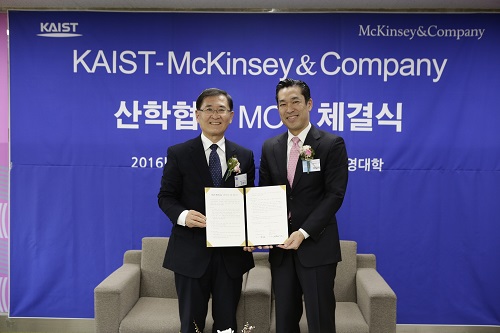 KAIST and McKinsey Korea Agreed to Cultivate Management Leaders
KAIST and McKinsey Korea signed a memorandum of understanding (MOU) for the “Joint Research on Innovative Instructional Method to Cultivate Future Management Leaders” on April 8, 2016, at the SUPEX Management Hall of KAIST Management School in Seoul.
Under the MOU, both organizations will cooperate in the following research areas: management strategies to overcome the low growth of Korean economy, instructional methods to foster leaders in the field of business and management, and innovative management systems for business.
President Kang said, “We are pleased to work with McKinsey, a worldwide management consulting firm, to foster leaders in science and business. As we see more demanding challenges of managing and leading science-based businesses today, this alliance is indeed timely and will be very helpful.”
2016.04.15 View 6102
KAIST and McKinsey Korea Agreed to Cultivate Management Leaders
KAIST and McKinsey Korea signed a memorandum of understanding (MOU) for the “Joint Research on Innovative Instructional Method to Cultivate Future Management Leaders” on April 8, 2016, at the SUPEX Management Hall of KAIST Management School in Seoul.
Under the MOU, both organizations will cooperate in the following research areas: management strategies to overcome the low growth of Korean economy, instructional methods to foster leaders in the field of business and management, and innovative management systems for business.
President Kang said, “We are pleased to work with McKinsey, a worldwide management consulting firm, to foster leaders in science and business. As we see more demanding challenges of managing and leading science-based businesses today, this alliance is indeed timely and will be very helpful.”
2016.04.15 View 6102 -
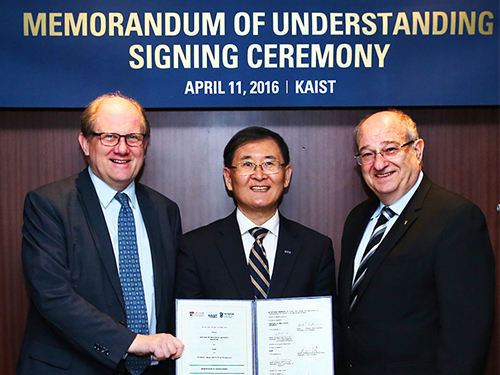 KAIST, NTU, and Technion Collaborate for Research in Emerging Fields
KAIST, Nanyang Technological University (NTU) of Singapore, and Technion of Israel signed an agreement on April 11, 2016 in Seoul to create a five-year joint research program for some of the most innovative and entrepreneurial areas: robotics, medical technologies, satellites, materials science and engineering, and entrepreneurship. Under the agreement, the universities will also offer dual degree opportunities, exchange visits, and internships.
In the picture from the left, Bertil Andersson of NTU, Sung-Mo Kang of KAIST, and Peretz Lavie of Technion hold the signed memorandum of understanding.
2016.04.14 View 12420
KAIST, NTU, and Technion Collaborate for Research in Emerging Fields
KAIST, Nanyang Technological University (NTU) of Singapore, and Technion of Israel signed an agreement on April 11, 2016 in Seoul to create a five-year joint research program for some of the most innovative and entrepreneurial areas: robotics, medical technologies, satellites, materials science and engineering, and entrepreneurship. Under the agreement, the universities will also offer dual degree opportunities, exchange visits, and internships.
In the picture from the left, Bertil Andersson of NTU, Sung-Mo Kang of KAIST, and Peretz Lavie of Technion hold the signed memorandum of understanding.
2016.04.14 View 12420 -
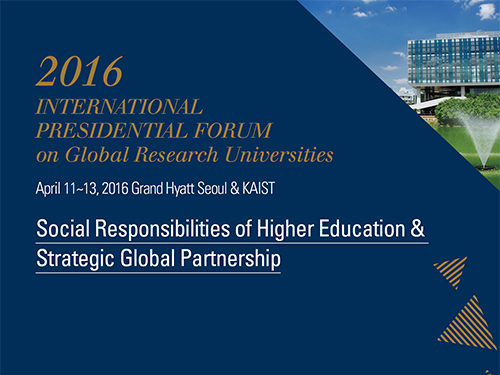 KAIST Hosts the 2016 IPFGRU
More than 120 senior representatives from 65 universities around the world will convene this month in Seoul to discuss the social responsibilities of higher education and strategic global partnerships among academia, research, and industry to advance socio-economic values.
Higher education as a driver of change to address the social and global challenges facing humanity in the 21st century has never been as important as it is today.
KAIST will raise the topic of higher education as a driver of social change, innovation, and entrepreneurship with the heads of global universities at its seventh international forum to be held on April 11-12, 2016 at the Grand Hyatt Hotel in Seoul, the Republic of Korea.
The 2016 International Presidential Forum on Global Research Universities (IPFGRU) will bring over 120 presidents and vice presidents of 65 research universities and institutes from 36 nations together to discuss the theme of “Social Responsibilities of Higher Education and Strategic Global Partnership.”
Presidents Sung-Mo Kang of KAIST, Jacques Biot of École Polytechnique in France, and Peretz Lavie of the Technion-Israel Institute of Technology will address the conference as plenary speakers.
President Kang will speak about KAIST’s initiatives to produce creative talents through student-centered education, entrepreneurship curricula, and the integration of humanities into cutting-edge research programs. His presentation, titled “The Fostering of Creative Talents and the Social Responsibility of Research Universities in the New Era,” introduces KAIST’s educational philosophy which can be represented as π. A broad range of understanding in basic disciplines (the horizontal line) is supported with one prong of in-depth knowledge in a chosen field and the other in entrepreneurial spirit.
KAIST graduates have demonstrated extraordinary leadership in research, academia, business, and public service. Nearly 25% of the research and development personnel at Samsung Electronics are KAIST Ph.D. holders. President Kang also describes KAIST’s latest endeavor to turn a university-led entrepreneurial activity into a stable business based on research outcomes and campus innovations. The K-School, a one-year master’s degree program on entrepreneurship and innovation, has just launched and is expecting to receive its first batch of students this fall. The K-School is envisioned to continue the university’s legacy as a major feeder for startups in Korea.
President Lavie will give a talk on “Fostering an Innovation and Entrepreneurship (I&E) Ecosystem in Israel,” in which he describes how the Technion-Israel Institute has become integral to the foundation of the nation’s I&E platform. Since its establishment in 1912, the university has become a key player in the growth of Israel’s industry, science, and technology while nurturing the majority of the nation’s top-notch researchers, innovators, and entrepreneurs. Technion graduates have created more than 2,000 companies in Israel alone, generating 100,000 jobs and USD 30 billion through mergers and acquisitions.
President Biot will offer his insights into how the future of global research universities will be widely impacted by the emergence of disruptions triggered by the Fourth Industrial Revolution. In his speech entitled “How to Prepare Our Universities for the New Era of Industry 4.0,” he emphasizes that universities should take multi-disciplinary approaches to tackle societal challenges given the complexity of today’s problems ranging from climate change to energy crises, pandemic diseases, and poverty. He argues that universities should identify the needs of students in “Generation Z” who, from birth, have been heavily exposed to the Internet and digital technologies and, thus, universities should develop new educational systems (i.e., University 4.0.) to better prepare these students to cope with Industry 4.0.
The IPFGRU consists of presentations and discussions addressing the following sub-topics:
- Seeking a New Model of Research Universities in a New Era: This session will explore the role of research universities as both innovation drivers and growth engines in an age of robotics, globalization, and digitally-driven markets. In addition, speakers will discuss how to prepare universities for the Industry 4.0 era, and how multidisciplinary approaches and open innovations will play a large part in facilitating translational research and technology transfer.
- Shared Challenges and Responsibilities from a Global Perspective: Universities will share their strategies, policies, and practices to respond to critical issues facing local and global communities such as youth unemployment, the environment, energy, inequality, and entrepreneurship.
- Strategic Global Partnerships for Sustainable Development: Panelists will discuss how to build productive and sustainable partnerships that can generate synergies between education and research.
- Insights into Higher Education: Trends and Development: Participants will examine how universities can stay relevant in an increasingly competitive higher education sector and can assist students to better adapt to opportunities and challenges posed by the new industry of digital transformation and exponentially-growing technologies.
Sung-Hyon Myaeng, the Associate Vice President of the International Office at KAIST and a Co-chair of the 2016 IPFGRU said,
“The IPFGRU was established in 2008 to promote excellence and innovation in higher education with presidents of leading research universities and key policy-makers in the private and public sectors from across the world. Since then, it has served as one of the largest university gatherings in Asia, allowing participants to cooperate and share their expertise, ideas, and best practices taking place in academia, industry, and government.”
“This year’s meeting has recorded the largest number of universities participating, including 28 European schools, 20 Asian institutions, and 8 schools from the Americas, which I believe reflects a sense of urgency that global universities share. One way or another, we must adapt to the rapidly transforming educational and research environment encompassing higher learning,” added Myaeng.
For more information, go to http://forum.kaist.ac.kr.
2016.04.08 View 9912
KAIST Hosts the 2016 IPFGRU
More than 120 senior representatives from 65 universities around the world will convene this month in Seoul to discuss the social responsibilities of higher education and strategic global partnerships among academia, research, and industry to advance socio-economic values.
Higher education as a driver of change to address the social and global challenges facing humanity in the 21st century has never been as important as it is today.
KAIST will raise the topic of higher education as a driver of social change, innovation, and entrepreneurship with the heads of global universities at its seventh international forum to be held on April 11-12, 2016 at the Grand Hyatt Hotel in Seoul, the Republic of Korea.
The 2016 International Presidential Forum on Global Research Universities (IPFGRU) will bring over 120 presidents and vice presidents of 65 research universities and institutes from 36 nations together to discuss the theme of “Social Responsibilities of Higher Education and Strategic Global Partnership.”
Presidents Sung-Mo Kang of KAIST, Jacques Biot of École Polytechnique in France, and Peretz Lavie of the Technion-Israel Institute of Technology will address the conference as plenary speakers.
President Kang will speak about KAIST’s initiatives to produce creative talents through student-centered education, entrepreneurship curricula, and the integration of humanities into cutting-edge research programs. His presentation, titled “The Fostering of Creative Talents and the Social Responsibility of Research Universities in the New Era,” introduces KAIST’s educational philosophy which can be represented as π. A broad range of understanding in basic disciplines (the horizontal line) is supported with one prong of in-depth knowledge in a chosen field and the other in entrepreneurial spirit.
KAIST graduates have demonstrated extraordinary leadership in research, academia, business, and public service. Nearly 25% of the research and development personnel at Samsung Electronics are KAIST Ph.D. holders. President Kang also describes KAIST’s latest endeavor to turn a university-led entrepreneurial activity into a stable business based on research outcomes and campus innovations. The K-School, a one-year master’s degree program on entrepreneurship and innovation, has just launched and is expecting to receive its first batch of students this fall. The K-School is envisioned to continue the university’s legacy as a major feeder for startups in Korea.
President Lavie will give a talk on “Fostering an Innovation and Entrepreneurship (I&E) Ecosystem in Israel,” in which he describes how the Technion-Israel Institute has become integral to the foundation of the nation’s I&E platform. Since its establishment in 1912, the university has become a key player in the growth of Israel’s industry, science, and technology while nurturing the majority of the nation’s top-notch researchers, innovators, and entrepreneurs. Technion graduates have created more than 2,000 companies in Israel alone, generating 100,000 jobs and USD 30 billion through mergers and acquisitions.
President Biot will offer his insights into how the future of global research universities will be widely impacted by the emergence of disruptions triggered by the Fourth Industrial Revolution. In his speech entitled “How to Prepare Our Universities for the New Era of Industry 4.0,” he emphasizes that universities should take multi-disciplinary approaches to tackle societal challenges given the complexity of today’s problems ranging from climate change to energy crises, pandemic diseases, and poverty. He argues that universities should identify the needs of students in “Generation Z” who, from birth, have been heavily exposed to the Internet and digital technologies and, thus, universities should develop new educational systems (i.e., University 4.0.) to better prepare these students to cope with Industry 4.0.
The IPFGRU consists of presentations and discussions addressing the following sub-topics:
- Seeking a New Model of Research Universities in a New Era: This session will explore the role of research universities as both innovation drivers and growth engines in an age of robotics, globalization, and digitally-driven markets. In addition, speakers will discuss how to prepare universities for the Industry 4.0 era, and how multidisciplinary approaches and open innovations will play a large part in facilitating translational research and technology transfer.
- Shared Challenges and Responsibilities from a Global Perspective: Universities will share their strategies, policies, and practices to respond to critical issues facing local and global communities such as youth unemployment, the environment, energy, inequality, and entrepreneurship.
- Strategic Global Partnerships for Sustainable Development: Panelists will discuss how to build productive and sustainable partnerships that can generate synergies between education and research.
- Insights into Higher Education: Trends and Development: Participants will examine how universities can stay relevant in an increasingly competitive higher education sector and can assist students to better adapt to opportunities and challenges posed by the new industry of digital transformation and exponentially-growing technologies.
Sung-Hyon Myaeng, the Associate Vice President of the International Office at KAIST and a Co-chair of the 2016 IPFGRU said,
“The IPFGRU was established in 2008 to promote excellence and innovation in higher education with presidents of leading research universities and key policy-makers in the private and public sectors from across the world. Since then, it has served as one of the largest university gatherings in Asia, allowing participants to cooperate and share their expertise, ideas, and best practices taking place in academia, industry, and government.”
“This year’s meeting has recorded the largest number of universities participating, including 28 European schools, 20 Asian institutions, and 8 schools from the Americas, which I believe reflects a sense of urgency that global universities share. One way or another, we must adapt to the rapidly transforming educational and research environment encompassing higher learning,” added Myaeng.
For more information, go to http://forum.kaist.ac.kr.
2016.04.08 View 9912